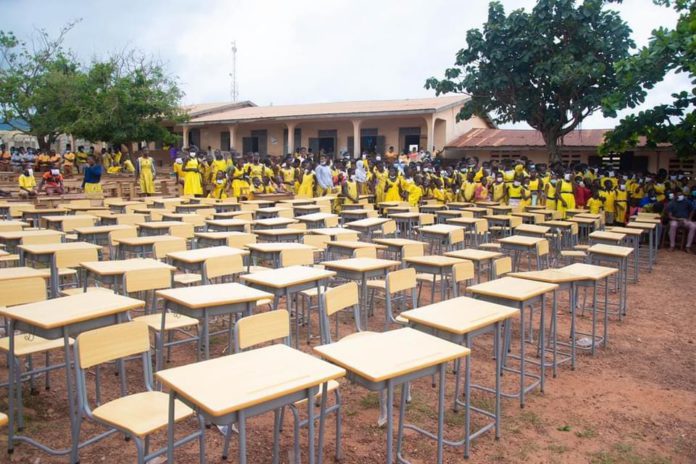Government would require some GH¢330 million to address the desk deficit in public basic schools to ensure that about 2.3 million pupils across the primary and junior high school (JHS) levels in the country have access to learning desks, a report has stated.
The report on the research conducted by an education think tank, Eduwatch, on the topic “Scoping study on the impact of desk deficits in public basic schools”, indicated that 80 per cent of these pupils in the northeastern region alone, were left to write on their bellies or the bare floor.
It said the desk deficit had been created as a result of the Pre-tertiary Education Act, which mandated district assemblies to provide infrastructure to public basic schools.
“However, this responsibility does not come with the financial capacity to address the situation as the MMDAs do not have the funds to readily provide these learning materials; hence, the desk deficits in most schools,” the Senior Programmes Officer of Eduwatch, Divine Kpe revealed.
“So from our research, it would cost the government some GH¢330 million to address the desk deficit in public basic schools; that is, if the current average investment of GH¢18 million in furniture provision at the basic school level continues, it will take Ghana about 18 years to address the desk deficit.
“Besides the GH¢330 million required to clear the desks backlog, about GH¢19 million is required to provide 54,800 desks needed each year for growth in pupil numbers,” he explained.
Key drivers
Presenting the key findings of the study in Accra, Mr Kpe explained that some key drivers of the desk deficit in the basic schools in the country were mostly a result of resource and deficit issues.

The participants
That, he said, could be observed through the awarding of new school building contracts without including the provision of desks.
“While the local government would ideally want to furnish such contracted classrooms with desks before inaugurating them for use, in many instances, the delay in securing funds to procure the desks leads to community pressure for the schools to be operationalised,” he said.
Additionally, GETFUND, which was the main source of revenue for infrastructure for education, was not fully allocating funds for top infrastructure as it was analysed to allocate more funds to non-infrastructure projects than infrastructure projects.
Mr Kpe also stated that the budget allocation for infrastructure was not gender-responsive as most budgets allocated from 2021 to 2023 did not indicate any gender-focused projects that had been specifically targeted to meet the peculiar needs of boys and girls making it “gender blind”.
Recommendations
In recommendations, the study suggested that the Ministry of Education must allocate 70 per cent of the GETFUND to infrastructure.
This will adequately provide infrastructure to schools that lack desks and create a comfortable environment for the pupils.
Also it suggested that the ministry prioritise infrastructure at the basic education level and allocate 50 per cent of the infrastructure budget to basic education.
“The MOE and District Assemblies should commit to a policy of ensuring no basic school infrastructure contract is awarded without the full component of school furniture, including desks and chairs,” the report recommended.
Dissemination
A Board Member of Eduwatch, Dorothy Konadu, stated that the study was started in 2021 with support from the Foreign Commonwealth Office (FCDO) and Star Ghana Foundation on the impact of desk deficit in public basic schools.
She noted that the dissemination sought to explore innovative ways of supporting education infrastructure, particularly desk provision at the local level.

